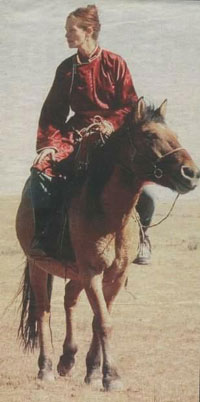
WILD HORSES OF MONGOLIA WITH JULIA ROBERTS
Mongolian soldiers face is calm and impenetrable. But the woman seated near him is restless, and her countenance betrays a trace of anxiety. Its Julia Roberts.
No, shes not under arrest, nor is she playing a fictional role. Constrained merely for the moment by official bureaucracy, Roberts awaits the paperwork that will allow her to leave Ulan Bator to pursue "one of the worlds best kept secrets" the nomads of Mongolia and their special relationship with "Genghis Khans greatest weapon": the wild horse.
The fascinating journey of discovery that follows is the essence of "Wild Horses of Mongolia With Julia Roberts," an adventure that launches the 19th season of NATURE Sunday, October 22, 2000, 8:00 p.m. ET (check local listings).
Mongolia is home to the only true wild horses known to exist. Roberts, who shares a passion for horses with the Mongolian people, went there to sample life as a nomad on the steppes of central Asia and learn first-hand why the wild horse has been an integral part of that culture for millennia
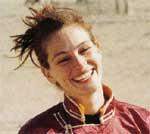
|  |
"This program continues NATUREs recent focus on the always fascinating relationship between wildlife and people," says executive producer Fred Kaufman. "Ms. Robertss experiences in Mongolia provide a compelling glimpse of a society whose culture and economy are bound to one of the most historically significant animals on Earth."
"Mongolia isnt about cities," Roberts says, upon leaving the capital. "Most Mongolians are nomads a tough life, hardly changed for thousands of years." She has accepted an invitation to spend several weeks with a nomadic family, living exactly as the family does in a one-room transportable "ger," with no bathroom, no running water, no heat, and, she adds, no shopping. "What will they make of me a girl from New York?" she wonders.
That proves to be a difficult question to answer at first. One of the most engaging and amusing aspects of Roberts experience is the way she is absorbed into the daily routine of nomadic life without being able to communicate with her hosts, since they dont speak each others language. When she isnt wrestling and playing games with the children, the family chats with her continually, but the messages get through only with smiles and universal gestures.
One day, the guest arises to discover that the family is about to seek fresh grazing land. "Oh, thats what were doing today were moving the house," Roberts deduces, as the men start to "unwrap" the gers. A ger is a circular enclosure made of wood frames and covered with several layers of canvas and heavy felt. Taking one apart is a social event, "like a party and Im actually having a good time in the freezing cold, deconstructing a house," she observes. "Who knew?"
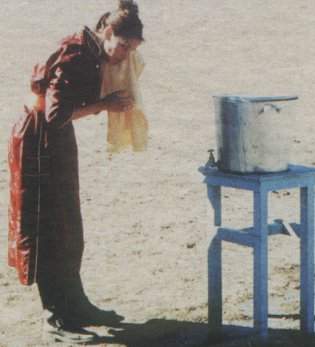
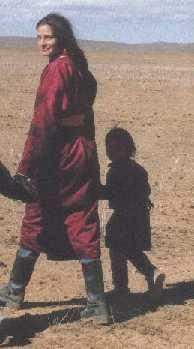
|
|  |
 |
 |
 |
 |
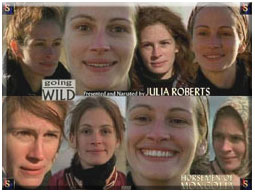
Roberts rapport with her Mongolian hosts is fostered in part by two potent factors: her love of children, which is amply demonstrated in her interaction with the family, and her passion and skill with respect to horses. The horse plays many vital roles for the nomads of Mongolia from the fermented mares milk that is a primary food staple, to transportation, to the races that are central to the nations culture and religious festivals.
After the family settles on a new site and reassembles the gers, the family patriarch, who is a leading herdsman, observes his herd of horses roaming within sight of the gers. Roberts comments on the amazing trust that human and animal seem to share. "For these horses to just be allowed to roam around and they dont take off and leave, never to be seen again is kind of amazing. Everywhere in America, you see animals and you also see fences here its really about the love and respect that man gives to the animal that they all stay together," she says.
The horse races are mainly for youngsters. Most Mongolian children learn to ride by the age of three, and horsemanship becomes a routine part of their lives long before they reach adulthood.
Although she wont be competing in the upcoming race, Roberts learns that when wild horses are chosen and broken in for the children, one will be selected for her as well. Her reaction is a mixture of excitement and wariness. "Im really actually scared," she says, because "its like a blind date to just get on a horse you dont know. And as we all know, blind dates can be disastrous. So Im hoping theres, you know, like a Benjamin Bratt in the horse outfit out there somewhere; be nice, give me a fun day. Not buck me off; that would be terrible." Actor Benjamin Bratt is Robertss boyfriend.
Roberts demonstrates her skill on a wild horse, and her adventure culminates with the excitement and drama of the childrens race. When she bids her hosts good-bye, two things seem evident. She has acquired a great respect and affection for a people and way of life that few outsiders know or understand. And at least one extended Mongolian family regards Julia Roberts as more than just a girl from New York.
|
 |
|
|